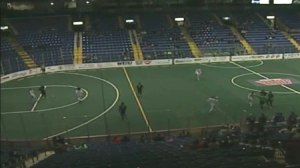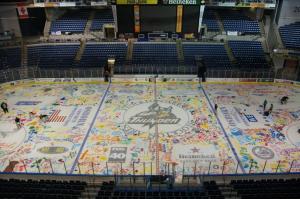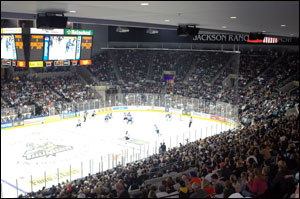Our entire business is working with minor league sports franchises in establishing a plan for long term sustainability.
Whether you are an established long term minor league sports brand in need of sponsorship or ticket sales assistance, or a new brand looking to launch in a new city, there is one thing that we consistently hear from our team sports clients.
“I wish we had more time”.
You see the season – every season – always comes upon you lightning fast, especially for a minor league club.
Each minor league team strives to provide the best sports and entertainment possible, just like our major league counterparts. The difference is, minor league clubs have to accomplish the same type of entertainment with only 10% of the staff. Most major league clubs have over 125 full time employees, while the best minor league teams have around 10. As long as you utilize those ten people in the right way, and find experienced sports marketers, you can have a long and successful life as a minor league franchise.
We recently worked with a potential ownership group that wanted to bring the Major Arena Soccer League (when we started the process it was the Major Indoor Soccer League, then it became the Professional Arena Soccer League, now it’s the Major Arena Soccer League).
We spent a little over a year assembling an ownership group, speaking with arenas in the region, negotiating three exclusive “founding partnerships” (field naming rights, jersey front and season long presenting partnership). We had begun the process of reviewing resumes for our full time staff, and looking at office space.
The plan was to roll out the brand identity package for the team and launch season ticket sales on June 1, 2014, and spend the next year and a half re-establishing the brand in the region (we were going to bring back a brand that was very popular in the 80’s and 90’s), selling season tickets and building on the $900,000 in sponsorships that were already committed (alright, it was $300,000 per year for three years).
After writing a dynamic business plan and putting the pieces together, we were told by the league that there was already a franchise rights holder in the market place (when the two leagues merged creating a coast to coast, 24 team league, it created a situation in our market where someone else owned a bankrupt franchise). We were asked to meet with the ownership group and see if we could put together a plan that would allow both groups to participate.
This is where timing comes into play.
We met with the group that informed us they would be playing this season. In November. In 7 months.
There was no way that we would jeopardize our plan by launching this season. It was simply not enough time, so we took our 1.9 million in capital and moved on.
This is our example, but I wanted to share with you a few things that new start up franchises (especially in fringe sports like indoor soccer) struggle with or fail to do all together, creating a “one and done” scenario like we are facing here in Tacoma.
STAFFING
Teams need to put a staffing plan together that is sales centric. Operations people can come later. The coach comes later. The players come later. Nothing happens until you have an experienced ticket sales director hire four or five account executives and you hit the market immediately after the press conference (after you have gone through the PSO360 sales training course that is).
If you don’t have people selling season tickets, groups and mini plans, you will die a long slow painful death. If you don’t have a strategic way to sell those seats, the death will be a little quicker.
Bottom line: Have a well trained staff, and a plan. Without these, the rest doesn’t matter.
ANNOUNCEMENT:
If you are a new brand, plan on a huge announcement at the arena or stadium. Engage the market by allowing them to “name the team” and have a public unveiling of that brand.
Do not announce that you are coming to town on Facebook or twitter, and do not send a press release without any details at all. Be prepared to answer questions at the press conference about season tickets (the best time to sell tickets is within 24 hours of the announcement – the phone should ring – so have a phone number, an email address tied to the team – not gmail or yahoo – and be prepared to take orders and visa cards).
If you announce of FB or twitter and then attempt to announce at a press conference, the suspense is gone and your audience no longer cares (as much).
Have your ticket prices set at the press conference, and if you have a “name the team” contest, be sure to have the contest outlined in detail before you announce it – nothing makes fans more mad than thinking they won, and then they haven’t. Be sure you don’t rig the contest by the way – in case that crossed your mind.
PRICE YOUR SPONSORSHIPS APPROPRIATELY
Most owners and rookie team management screw this up big time. They either over price their sponsorships because they believe they can demand six figures for a dasher board sign, or they way undervalue their sponsorships just to get some quick cash and say they “sold out”.
We worked with a hockey team that was selling their dasher board signs for $500.00 (for one) for a season. You could buy the sign either alone or as a part of a package. If you do the math, the team was generating $24,000 from their most coveted property – in arena signage (it was the only in arena signage the team had available, because like most minor league teams, they were only tenants of the arena).
We took over the sponsorship program two years ago, and completely re-vamped the inventory. We split the board inventory up into 10 foot, 15 foot and 20 foot signs (the 20 footer was behind each goal). Instead of $500.00 a board, you would get a pair, and the least expensive pair was $10,000 per season. In addition to this, you could not simply purchase a pair of dasher boards for a season. We packaged it with radio, tickets, and promotions and you had to commit to three years. Our least expensive package went from $250.00 (program ad) to $20,000 (it included a program ad too)
The end result was astonishing. While we did lose a few clients who could not afford more than their $250.00 program ad (all but one still supported the team with a ticket purchase), our sponsorship revenue for this club went from $190,000 per season to 1.19 million, in just a year.
The team had undervalued their sponsorships so badly. You need to understand what your values are – because this type of turn around doesn’t happen every day.
Most importantly you are not a sponsorship sales professional anymore – be creative, you need to know how to use team sports to sell more beer, drive auto sales, activate cell phones, and sell more produce at the local Fred Meyer. If you can’t effectively drive traffic to retail locations, get someone who knows how to do this – because the only thing the sponsor cares about is selling more stuff. If done correctly, sports works so much better than radio, television, online or print. Seriously.
YOUR TICKET HOLDERS ARE YOUR LIFE
Have a plan in place to reward your season ticket holders. The Seattle Sounders have a tremendous program with the “Match Pass”, and many other teams do great things to allow access to players.
With one team we worked with, we allowed our front row season ticket holders (the most expensive ticket in the arena) access to the locker room up to 30 minutes before game time. Yes, you could go into the locker room up to a half hour before the game. Once we made the announcement, we sold out those season tickets in an hour and a half.
The industry average for renewals is in the 70% range, we are tracking at 84%. Our season seat holders are the most important people in the universe, and yours should be to. Frequent in arena contact and follow up after games is critical, and always solve their concerns immediately.

The Penn Roar opened their offices in June of last year, and played to crowds like this all season long. The team folded two weeks ago. You too can be a one and done franchise.
PLAN YOUR PROMOTIONS
Seriously, if you do not plan your promotional calendar, and release it with a media partner and a sponsor, don’t bother. Fans want the most bang for their buck, and if you are just going to open the doors and roll out the ball or puck, you might have a good opening night crowd, but they won’t come back.

The ECHL’s Stockton Thunder received National Attention for their “We Paint The Ice Night”. The team actually played on this ice surface.
As a part of this series – we will be reviewing clubs throughout the country. It will be titled “don’t let this happen to you”.
There are a number of others, but if you have the time to build a brand over a year period – do it. In our case with the Major Arena Soccer League, we were told that the league has so many great announcements, that they needed to announce this team and play this year. Those announcements were supposed to happen last week.
Tick…Tock… Time is running out.
Nothing happens until someone makes a sale.
NEXT WEEK: MARKETING
